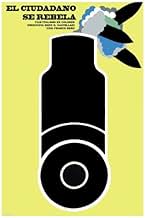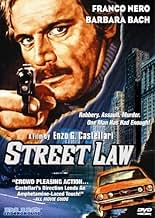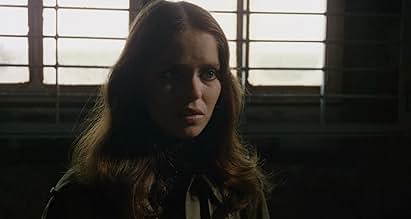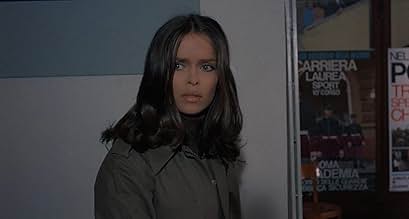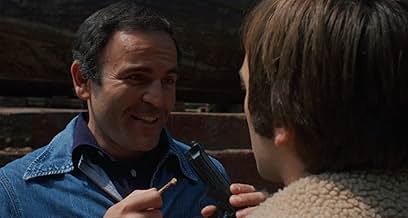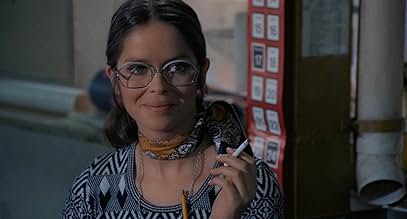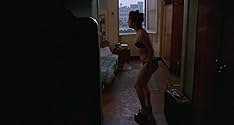Ajouter une intrigue dans votre langueAn engineer seeks vigilante justice against the gangsters who took him hostage, and forms an unlikely partnership with a young robber to bring them down.An engineer seeks vigilante justice against the gangsters who took him hostage, and forms an unlikely partnership with a young robber to bring them down.An engineer seeks vigilante justice against the gangsters who took him hostage, and forms an unlikely partnership with a young robber to bring them down.
- Réalisation
- Scénario
- Casting principal
- Gianni Rubei
- (as Luigi Guerra)
- Photograph
- (non crédité)
- Gangster at Drydock
- (non crédité)
- Casinò Gambler
- (non crédité)
- Gunman with Glasses
- (non crédité)
- Police Officer
- (non crédité)
- Michael Gambino
- (non crédité)
Avis à la une
The plot details Nero's quest to bring three bank robbers (Romano Puppo, Nazzareno Zamperla, and Massimo Vanni) who took him hostage and beat him up to justice. To do this, he blackmails a local street thug (Giancarlo Prete in a good role) and forces him to show him around the underworld and eventually find them to exact vigilante justice on them. What sets this mundane tale apart are the frequent changes-of-alliance and doublecrosses, as the action sequences are relatively weak (considering it's a Castellari movie). STREET LAW is not really that violent either when compared with most other Italian crime films. (Compare Romano Puppo's final scene here with a similar scene in Lucio Fulci's CONTRABAND.)
Guido and Maurizio De Angelis's score is certainly similar to their work for the many Bud Spencer / Terence Hill films (though not under their usual Oliver Onions pseudonym), but to me sounds a lot better. While the songs are weird and use seemingly every possible instrument and sound in the book, the "Good Bye My Friend" song is a great song even though the lyrics in most of it make no sense. The same can be said of "Driving All Around". Nero once again plays the same character he plays in every movie, but his character is not totally developed (though that may have been hurt severely by the confusing re-editing of the US version that I saw) and his relationship with his girlfriend Barbara Bach is barely touched on. While the plot is simple, it often becomes uninteresting, and certainly doesn't have the more epic feeling of Castellari/Nero's previous film High Crime. Castellari's next film (the goofy but surreal CRY ONION) tried to capitalize off this one, with Nero once again up against the same trio of thugs along with another over-the-top De Angelis score, though any similarity with this film ends there.
Watch for an amusing cameo by charismatic American actor Mickey Knox (who made a career as a dubbing voice in many Italian movies and Japanese Anime cartoons) as a gangster who runs a gaming parlor.
Not a great film, but colorful and different enough to make it entertaining to most casual viewers.
Very much a period piece, if it seems a bit much at times, you need to read up on what Italian society was like when this was filmed. A strike every other day, a bombing on the off days, petty crime rampant, sex drugs and rock 'n roll everywhere, police on the take, mafia shakedowns about anywhere, kidnappings, extortion... If you're not going to make a primo revenge flick in that milieu, I guess you never will. The Italian title is more descriptive. "A Citizen who Rebels".
Le saviez-vous
- AnecdotesFranco Nero did almost all of his own stunts.
- GaffesAfter two young thugs hit Franco Nero's car and threaten him, a boom mike is reflected in their car as they drive off.
- Citations
Tommy: [Tommy felt unconscious and almost bleed to death, after being shot by the group of muggers] Hah, we made it... We got rid of them.
Carlo Antonelli: Hah, you bet your ass.
Tommy: [Carlo put unconscious Tommy aside from the bulldozer] The garage. I deserve... my down payment, huh?
Carlo Antonelli: You sure do. We are going to open the biggest garage of all time. You'll be famous. Big Tommy, a real personality, and all the girls will come to your garage just to see Big Tommy!
Tommy: [still straining] Jesus... What a big garage you found...
Carlo Antonelli: Yeah.
Tommy: It's the biggest place... I've ever seen.
Carlo Antonelli: [in tears] And we'll fill it with cars. There'll be so many, there won't be room to work. Over there... Over there we'll put the race cars. The bodyworks will go over there. And the motors, you can fix in that corner. And we'll pipe in music.There will be a beautiful waiting room, and,
Carlo Antonelli: [Tommy dies] ... and we'll have a place for snacks. What do you think, partner?
Carlo Antonelli: [looks at the dying Tommy] GOD!
- Versions alternativesUS VHS release (renamed Street Law) is heavily cut (77 min's). Compared to the UK home video releases it is almost 24 min's shorter (when converted to PAL speed). DVD by Blue Underground is uncut.
- ConnexionsFeatured in Street Law: Laying Down the Law (2006)
- Bandes originalesGoodbye My Friend
(uncredited)
Written by Guido De Angelis, Maurizio De Angelis, Cesare De Natale and Susan Duncan Smith
Arranged and conducted by Guido De Angelis and Maurizio De Angelis
Sung by Cesare De Natale and Susan Duncan Smith
Meilleurs choix
- How long is Street Law?Alimenté par Alexa
Détails
- Durée
- 1h 42min(102 min)
- Mixage
- Rapport de forme
- 1.85 : 1

